Burma’s Ministry of Home Affairs and commercial television channel SkyNet have cooperated to launch a weekly programme that shows how conditions in the country’s notorious prison system are supposedly improving.
The 30-minute programme, titled “Rays of Lights That Impact,” was first broadcast Monday on SkyNet’s Home Channel, one of several local channels produced by SkyNet, which also runs dozens of international channels.
The show featured lengthy interviews with prison department officers, who explained that prison conditions had improved in recent years and how vocational programmes and Buddhist meditation courses were preparing prisoners for a life beyond the walls.
“We organise activities for the prisoners, related with religious practices, health and education, sports and entertainment,” Maung Maung Aye, the director of the Yangon Region Correctional Department, told SkyNet.
“We provide vocational training to prisoners so that they are ready to make a living after they are released.”
A few minutes were reserved for actual footage from inside Rangoon’s Insein Prison and brief interviews with three female prisoners.
Thin Kyaw, an official of the SkyNet Home Channel, said the channel has an actual contract with the Home Affairs Ministry — which is run by the military — obliging it to run daily programmes about activities of the ministry’s various departments.
He said producers recently decided to create a show on prison conditions.
SkyNet is part of Shwe Than Lwin Media Co. conglomerate of businessman Kyaw Win, who maintained close ties with the military in the past.
Min Tun Soe, a spokesperson for the Correctional Department, said the Ministry of Home Affairs was cooperating with SkyNet “to show to the public that we have made some progress in prison reforms.”
He claimed that the TV channel — and not the Ministry of Home Affairs — had proposed the show.
However, the public relations effort by the ministry comes at a time of growing attention for Burma’s prison system, which was infamous for holding thousands of political prisoners during the previous military junta, and for harsh conditions that frequently lead to deaths or illness among inmates.
Burma’s democratic reforms of recent years have largely bypassed the Correctional Department, which operates 46 prisons and 48 prison labor camps where an estimated 100,000 convicts are serving sentences.
[related]
During the previous, quasi-civilian government of former President Thein Sein, food and housing conditions in prisons are said to have improved, but a recent in-depth investigation by Myanmar Now revealed widespread abuse, corruption and exploitation of prisoners held in labour camps.
Local media widely circulated the investigation’s findings, which showed human rights violations, breach of prison rules and forced labour were rife in the camps, where some 20,000 inmates toil in plantations or rock quarries.
The new National League for Democracy government appears to have made no effort so far to address poor prison conditions, despite the fact that many party members once served time inside the facilities as political prisoners.



